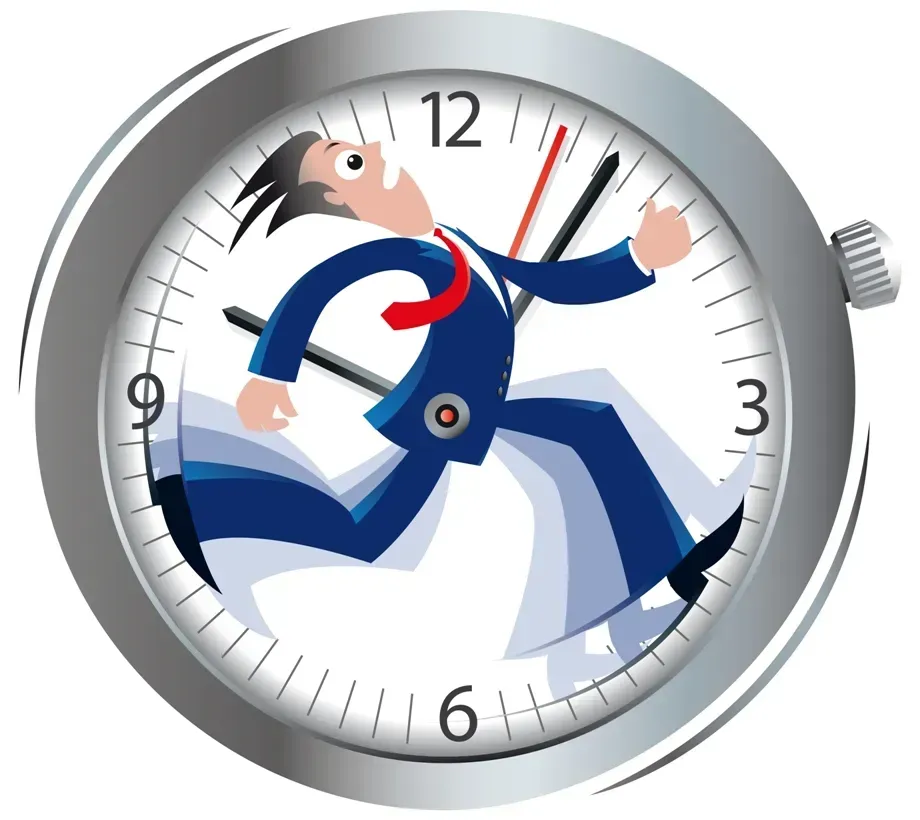10 Tips for Better Time Management

Ten key tips for improving our ability to manage the time we have available more effectively, reproduced from a paper delivered to the 16th Annual Payroll Conference held in Christchurch, New Zealand, on 27 March 2013.
1) Understand what you’re good at and not good at. What we’re good at we tend to enjoy more and be more efficient and productive at. Give a priority to doing what you’re good at and find others to do what you’re not good at and not so efficient at doing.
2) The stuff you don’t want to do but you have to do get on to it first and as part of a routine. Maybe 8am-9am is your old email clearing time, or maybe you hate doing the dishes so either a) get a dishwasher (some of us call them ‘children’; it’s not easy to get them to do stuff I know but that’s part of parenting – you get to have revenge when they have children) or b) get on to them fairly soon after you’ve eaten. Whatever it may be remember that delaying the time we take to do the mundane just places that time demand somewhere else and creates a sense of non-achievement (because it’s stuff still waiting to be done). How often have we woken up in the morning and walked into the kitchen to find last night’s unwashed dishes on the bench and groaned. We end up using the same time we would have used last night to wash them, but in a tighter and more stressful time frame because we have to go to work.
3) Make a meeting with yourself – regularly. This is your time, maybe to catch up on things, maybe to make some phone calls you need to, maybe to go for a walk or run, maybe to think and reflect, maybe to plan and prepare. Whatever the reason, we don’t like to break a meeting we have made with others so why shouldn’t we use the same sense of respect on ourselves.
4) Let go of trying to find more time. Time is like money. Yes there’s a level below which its availability significantly crimps our basic enjoyment of life but in general it’s not how much you have it’s what you do with it. Identify what’s important to you – family, work, health, relationships, interests and hobbies, or whatever. At the start of each day plan to do at least one thing that contributes to each and prioritise it. Maybe it’s a kiss, maybe a thank you, maybe a smile, maybe some time with others, maybe a phone call or text, maybe some new learning. Whatever it is it means that at least part of each day is you working on making your day great rather than someone else’s.
5) When stuff starts to build up learn to use the Four D’s. Do, delegate, delay, or drop. Enough said. Not everything is critical or needs you involvement in it even if you want to be.
6) Get a diary. Whether you’re a list person or not, organised or disorganised, old or young, old school (paper diary) or electronic (phone app or computer program) don’t rely on memory alone. Memory may give a sense of freedom and a diary may create a sense of impending obligations but the former is one of blissful ignorance while the later ensures we stay on top of what we need to do, with who, when, where, and why.
7) If you have a diary make sure you use it effectively. A diary replaces your short-term memory but like baking a cake it’s only as nice as the ingredients you put in it. What’s more the ingredients need to go in to the cake in the right order. The most important stuff (not what others think is important but that is important to you because it gives you energy or will save you time later on) goes in the cake [and is prioritised in the diary] first.
8) Don’t obsess so much about stuff you didn’t get around to today. When we’re up late at night doing stuff it usually means one of three things: a) we messed around a bit and chose to spend some of our time earlier less effectively than we could have, b) we chose a delayed consequence, or c) we were working on what was important for someone else at the expense of ourselves.
9) Respect what you miss doing and prioritise doing more of it in the future. We let things go we used to enjoy and the consequence is we add to load without any commensurate increase in our performance. Any organism can only take so much load before it squeezes itself dry (figuratively speaking). Often we tell ourselves we keep taking on board more responsibility and tasks because we’ll let others down who have expectations of us. In reality what we’ve done is develop a habit of putting others first. This is noble and admirable but too much of this means we run on empty and before we know it resent all that we have on our plate. We choose what we have on our plate; no one else does.
10) Only ever plan to use no more than 80% of the time you have. The other 20% isn’t wasted. It’s there for Murphy’s Law to arrive in a blaze of trumpets. It’s there for the meetings that go over time, and the telephone calls that take ages, and the emails that take longer than anticipated to write. It’s the elastic in your day.
JOHNATHAN BLACK
Chartered Organisational Psychologist & Founding Director of Farsight Limited
Jonathan is a registered psychologist with the New Zealand Psychologists Board and a Chartered member of the Institute of Organisational Psychology with the New Zealand Psychological Society. Specialising in conflict, communication, safety, performance and leadership he provides a broad range of services in these and other fields and his advice has been sought across Australasia and Europe.

